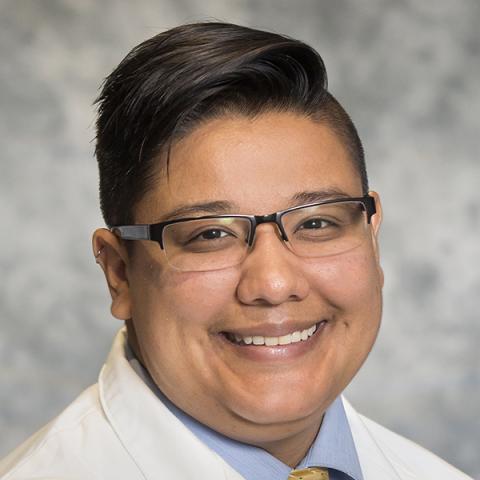My path to medicine began as a young child watching the health challenges faced by my family. This included Hepatitis C from a bad blood transfusion before more stringent blood testing protocols were put into place, many battles with breast cancer, kidney cancer, and chronic medical conditions such as Diabetes, hypertension, depression and anxiety, just to name a few. My mother has been fortunate to have received three organ transplants: 2 liver transplants and a kidney donated to her by her youngest sister. And these health issues are all too common in my home community along the Texas-Mexico border.
To say that I grew up in hospitals and clinics is an understatement. Now, as a resident, two of my primary objectives are to learn how to be a good doctor and to provide good patient care. This includes learning how to do many of the things commonly seen on medical TV shows: diagnosing and treating a variety of conditions, critically analyzing evidence and weighing the best options for patient care, delivering bad news in ways that are sensitive and understanding, and advocating for patients.
It also includes learning how to best communicate with other team members, how to juggle an always-beeping pager with other tasks, and how to help patients access resources in their community. I spend a lot of time thinking about all the things I do not yet know and about how I can work toward becoming the kind of physician my patients need and deserve.
I have turned to my family to learn, from their perspective, what makes a good doctor. Here is what they shared with me:
Listen to your patients.
They are experts on their bodies and on their experiences. My father shared how he has struggled to regain his trust in doctors and the medical system after his concerns about new chest pain were written off by two doctors as anxiety. He subsequently was found to have three occluded vessels and required triple bypass surgery.
Never forget that patients are in charge of their bodies and they should always have an active role in their care.
My mother shared how it was common for doctors to come into the room to discuss the plan for the day with the team and never speak to her directly. She talked about the importance of explaining things in ways patients can easily understand and be able to participate in shared decision-making to ensure the plan you put in place is realistic and aligned with the patient’s goals or means.
Being told something is not the same as understanding what has been said, particularly if there is a language barrier.
My sister shared how as a clinical social work intern, she has rounded with provider teams and seen multiple instances where interpreters were not called or were unavailable. She said that this resulted in spending less time in the rooms of non-English speaking patients, less shared decision-making, and less understanding about what was happening. Later on, when she visited those patients, they shared that they did not understand what was happening and that they couldn’t tell anyone what they were feeling.
Take the time to read the medical chart.
My mother shared how she has been wrongly given medications that she has allergies to, despite having been asked about it multiple times and also wearing a bracelet that has her allergies listed.
If you do not know something, just be honest about it.
It is better to share your uncertainty and lay out a plan for how we can get answers, or else tell us what we can expect if there is no way to completely be confident about the diagnosis. My dad shared his worry after multiple hospital staff told us different diagnoses in response to our questions about my mom’s altered mental status. However, when asked to explain what tests had come back that caused them to think that, many of them had incorrect information or had not yet reviewed any results.
Medication is sometimes necessary, but it isn’t always the solution to what ails your patients.
My sister shared about the many times she had seen her clients be prescribed medications without any plan for addressing some of the social barriers that were causing them to have their symptoms or keeping them from being able to care for themselves and stay healthy.
I agree with all the advice my family gave me, but I also think of all the times I have failed to do some of those things and some of the reasons why: lack of time, lack of resources, being scared to ask for help, having a high patient load, etc. There are facets of how we operate and the policies we employ that are not always conducive to us practicing medicine the way that we would like and can often result in disparities in patient care. This is why it is important as medical providers that we continuously ask ourselves if these systems, policies, or practices help or hurt our patients and colleagues. If not, then we have a duty to speak up and work to change them.
We all have a role to play in seeking to improve the medical system, to push forward new policies and practices, and to innovate. Most importantly, we need to continue to find ways to elevate the voices of our patients and to include them in these efforts. Our patients are one of our biggest assets in learning to be excellent doctors. I am forever grateful for the ways that my family and my patients are training me every day.
Ry Garcia-Sampson, M.D., MPH, is a second-year resident with the Duke Family Medicine Residency Program. Email ry.garciasampson@duke.edu with questions.
Editor’s note: Duke Family Medicine residents guest blog every month. Blogs represent the opinion of the author, not the Duke Family Medicine Residency Program, the Department of Family Medicine and Community Health, or Duke University.
